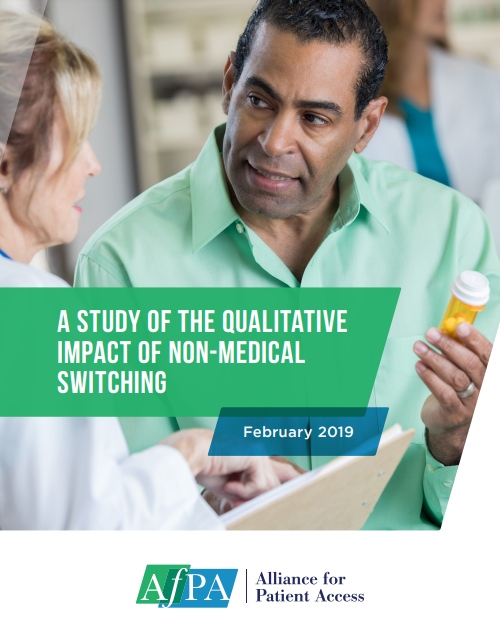 Health plans’ attempts to cut costs can wreak havoc on patients’ lives, new research makes clear.
Health plans’ attempts to cut costs can wreak havoc on patients’ lives, new research makes clear.
In a first-of-its-kind study, the Alliance for Patient Access reveals that non-medical switching, where insurers or pharmacy benefit managers drive stable patients to switch to lower-cost medicines, can levy widespread damage on patients’ quality of life.
In a statement from the Alliance for Patient Access, Executive Director Brian Kennedy explained, “Non-medical switching too often undermines a patient’s health and results in increased health care expenditures; that much was already understood. But this study, for the first time, establishes that the qualitative impact on a patient’s daily life can be equally devastating. The data shows that non-medical switching chips away at nearly every facet of patients’ lives, from their health to their family life and work productivity to their emotional well-being.”
Key Findings
The study, which entailed two in-person focus groups followed by a national online poll of 800 patients who had endured a non-medical switch, revealed that non-medical switching most often occurs due to the insurer:
- Restricting its formulary to exclude coverage for the patients’ original medicine (41%) or
- Altering coverage in a way that increases patients’ out-of-pocket costs (33%).
Patients most often find out about the switch at the pharmacy counter (48%).
The switch can come as a real blow. Patients reported:
- Placing a high value on having the right medicine (95%)
- Depending upon their original medicine to go about their day-to-day lives (88%)
- That it was tough to find that initial medicine that worked for them (60%).
The situation doesn’t get any better from there. Patients reported a slew of consequences, from an impact on their health to increased health care utilization.
- Nearly 40 percent of patients said the new medicine was not as effective
- Almost 60 percent experienced a complication from the new medication, such as a reemerging disease symptom, a new side effect or an interaction with another medication they take
- Nearly one in 10 reported being hospitalized for complications after the switch.
Effect on Home Life & Work Life
Patients also revealed that the non-medical switch impacted their home life, reporting that:
- “I wasn’t able to continue my regular hobbies or activities, or I didn’t find the same enjoyment in them” (52%)
- “I wasn’t able to care for my children, grandchildren, spouse, parents or other family members like I needed to” (43%)
- “I wasn’t able to attend or fully participate in life events such as birthdays, holidays, family vacations, or weddings of family members or close friends” (48%)
- “My relationship with a family member or friend suffered as a result” (42%).
Work and civic responsibilities also suffered. Patients responded that:
- “My ability to focus or be productive at work was impacted by problems, symptoms or side effects related to having my medicine switched” (66%)
- “I missed work due to problems, symptoms, side effects or medical appointments related to my new medicine” (55%)
- “My relationship with colleagues and my interaction with them in meetings, conference calls or work-related events was impacted by problems, symptoms or side effects related to having my medicine switched” (56%).
Impact on Physician-Patient Relationship
The switch undercuts patients’ relationships with their health care providers, who otherwise emerged as patients’ trusted allies throughout the non-medical switching experience:
- My health care provider and I had already decided how to treat my condition, and the insurer’s switch disrupted our plans (73%)
- My health care provider and I both felt frustrated about the switch (72%)
- The insurer took control of a decision that rightfully belongs to my doctor or health care provider (86%).
Emotional Impact & Medication Abandonment
Finally, respondents admitted that the switch left them feeling:
- 75% “Anxiety about losing a medicine I depended upon.”
- 83% “Frustrated”
- 72% “Confused”
- 70% “Helpless.”
For some, it was just too much. Almost 40 percent of patients reported that being switched was so frustrating that it led them to stop taking their medicine altogether.
Policy Solutions
Could better policy help patients? The patients in AfPA’s study think so. They suggested that lawmakers:
- “Give the power to make medical decisions back to my health care provider” (90%)
- Provide clear communication to patients (92%)
- Offer a straightforward appeals process (92%)
- Provide ongoing coverage for treating ongoing conditions experienced by patients for as long as they are on the health plan (91%).
Related Research
AfPA’s findings can be found in the full report as well as the condensed research abstract.
This study complements 2017 research by the Institute for Patient Access, which examined whether non-medical switching saves money for the health care system. That study found that cost-motivated medication switches lead to higher non-drug medical costs for services like doctor’s visits, hospitalizations and ER visits for several chronic disease states.

